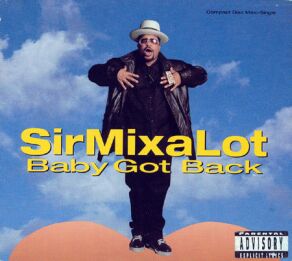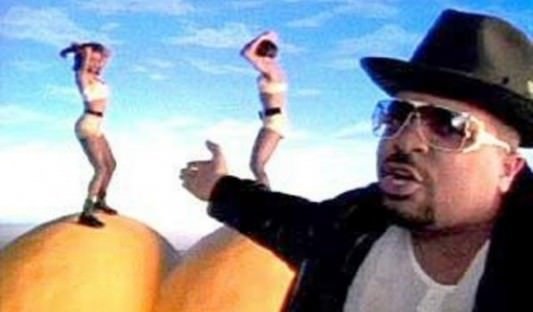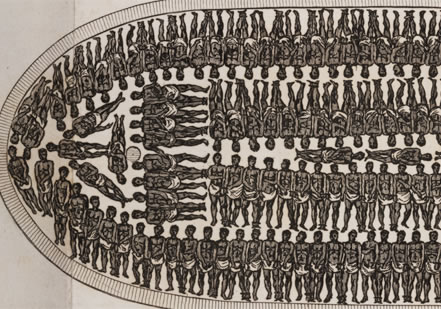Trinidad James allegedly Harvard University Graduate
>> Sunday, December 23, 2012
Do you think Trinidad James could attend Harvard University?
 |
| Sir MixaLot's "Baby Got Back" |
 |
| Sir MixaLot in Big Booty Heaven, during "Baby Got Back" video. |
I got protesters saying our economy blows And my Wall Street brothers want Occupy closed You b*tches keep saying, "No change = no votes." I work for the banks, stupid. What type of threats are those?In start contrast to the Tea Party protests of 2009, Occupy Wall Street was a major critique of financial capital and capitalism. Yet, despite many tough words, Obama supported the bank bailouts, receive record Wall Street campaign contributions, his economic advisers and appointees were from big banks too. The second verse parodies Jay-Z's experience being pulled over by a racist cop while driving with a cocaine hidden inside. Jay characterizes the cop as having a sort of southern, lower class, nasal voice. In this version, Obama is speaking about his ascendancy to the White House:
"The year is 2009, and the White House is mine But the economy’s in full mother f*cking decline My choices at the time were to sh*t on the poor or Fellate the banks to get elected once more"What were Obama's choices at the time? Were there other alternatives than to 'fellate' the banks or defecate on the poor? In the Obama-Mitt (cop) dialogue, instead of asking to search his trunk, Mitt wants Obama to prove his citizenship:
"I ain't steppin’ down from shit ‘cause this president's legit 'Well, do you mind if we see that birth certificate?' All my records are blocked, you conspiracy hack. And I know my rights. So, you gon' need a warrant for that"In the outro, anyone still comparing Obama to King is up for a rude awakening to that 'dream.' The video indicts the Nobel Peace Prize winning Obama for "fraud, repression," and "deceit":
Criminal, fraud, repression, deceit I murder and I plunder for the world elite We invade countries till we have all they own “I have a dream.” Well, I have a droneIn 2009, many people conflated Obama's ascendancy to the presidency as the realization of Dr. King's "dream." Yet, dreams and "drones" are not compatible. King opposed militarism and called the United States the "greatest purveyor of violence" on the planet. Thus this line, simply, draws the contrast between the two figures. (Where's Rev. Wright?) What do you think of the video? Will this have any impact on the election? And if you're into Hip Hop history, Jay-Z's song was taken from an old Ice-T track. And the beat's producer, Rick Rubin, used to produced for early Hip Hop acts like Run DMC. Note: I drafted this blog post for a class. Thought I'd share.
Can you imagine being held captive on A Slave Ship? On a two month journey from Africa to the Americas, separated from family, eating mush, seeing people you've grown close to during your treacherous journey being thrown to the sharks that follow your vessel.
Here are your sleeping accommodations:
Many people do not want to be reminded of the Transatlantic Slave Trade. We're supposed to forget it because it was a long-time ago; however, slavery still exists in the world, and America, in many forms, whether it be human trafficking for sexual exploitation and sweat shop labor, domestic servitude in many societies, or the warehousing of Black Men in the U.S. often called the "Prison Industrial Complex."
Today, my History professor played The O'jays' song, "Ship A'hoy." The song is an appropriate accompaniment for our text, Marcus Rediker's "Slave Ship: A Human History." The book approaches the European-dominated Transatlantic Slave Trade, in which cheap manufactured goods from Europe were shipped to Africa in exchange for labor (human beings) that (who) was (were) shipped to the Americas for raw materials. He approaches the "drama" focusing on the trade as a commercial set of transactions that affected everyone, including not only enslaved Africans, but the crews who worked in the trade, and merchants who sponsored and "invested" in the sale of human beings. Simply: It's a story of human beings and the machines that carried them.
The O'jays also provokes another memory. Besides a profound connection to the plight and suffering of my unnamed ancestors who survived the Maafa, I remember my first experience with Leadership Excellence's workshop, "The Middle Passage." The experiential workshop exposes participants to a sliver of a glimpse of what our ancestors experienced: pre-colonial life, Middle Passage, enslavement, Jim Crow, Civil Rights/Black Power Movement, to our present condition.
So I write this to honor those who came before me. Both those who would rather die than serve White Supremacy and Capitalism, as well as those who endured in order for us to breathe and breed in hopes that one day, we would see a freedom that shines brighter than the gold coin in the sky.
Hurricane Katrina touched down on North American soil seven years ago today. The storm, and the (lack of) response by the United States' government, led to nearly 2,000 reported deaths, not to mention the extrajudicial murders of Black people.
In the immediate aftermath, I wrote the song, "Waiting in the Water," using the Negro Spiritual "Wade in the Water" to describe the modern day Maafa (Swahili for 'tragedy').
Below is an excerpt from a performance of that song and the lyrics from the second verse.
Verse 2, I’m asking what would you do?/
If you were in the same situation, try to be true/
Could you loot? I know that I would/
Be getting food and water distributing it in the hood/
WalMart, in Aisle 3, that’s me assorting goods/
Getting everything I need from sporting goods/
Helping elderly with inflatable rafts/
Grocery bags for my nephews’ leg in the cast/
I’ve seen mothers crying, sisters and brothers dying/
Media lying while we watching choppers flying/
Over the disaster area surveying the damage/
Instead of taking people food, they taking pictures with cameras/
Not supplying people with their basic needs/
And feeding folks, they jive supplying news live feeds/
They got the tigers outta the zoo/
If you were there, do you think they would have saved you?/
 "The Case of the 'Stolen' Camera"
How my best friend, "Rebella," was Lost & Found.
"The Case of the 'Stolen' Camera"
How my best friend, "Rebella," was Lost & Found.
© Blogger template Webnolia by Ourblogtemplates.com 2009
Back to TOP